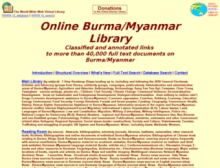Resource information
... Extremely rapid growth in Chinese imports of ‘redwood’, ‘rosewoods’ or ‘Hongmu’ timbers from Myanmar in the past two years is directly driving increased illegal and unsustainable logging, posing a real threat to governance, the rule of law and the viability Myanmar’s dwindling forests. EIA research shows that, based on current trends, the two most targeted Hongmu species in
Myanmar - tamalan and padauk - could be logged to commercial extinction in as little as three years.
With financial rewards for illegal loggers and timber smugglers dwarfing traditional incomes, and evidence of corruption facilitating illegal business, Myanmar’s domestic controls will be unable to effectively stem illegal trade. Myanmar urgently needs to engender legal reciprocity from strategic timber trade partners,
particularly China, to ensure Myanmar’s forestry and trade laws are respected along its land border.
In the absence of laws prohibiting illegal timber in China, the Convention on International Trade in Endangered Species (CITES) presents the most immediate and effective mechanism to secure China’s respect for Myanmar’s forestry and trade laws.
The Myanmar Government should seek CITES Appendix III protection for its at-risk Hongmu species – Dalbergia oliveri / bariensis (tamalan) and Pterocarpus macrocarpus (padauk) - at the soonest opportunity to ensure trade is in line with sustainable exploitation of existing standing stocks.
The CITES community should assist Myanmar in both instituting and enforcing CITES listings for these key species, and in seeking regional Appendix II listings by the 17th CITES Conference of the Parties (CoP17) in 2016. Enhancing the capacity of Myanmar’s existing CITES Management and Scientific Authorities will be an important element of this work....



